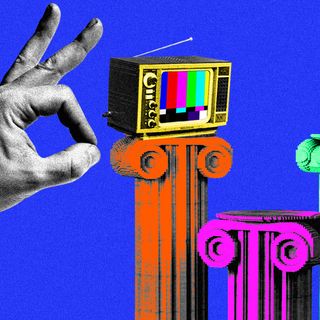
It’s Okay: To Live in Denial Sometimes
Sometimes, denial is our best friend, offering the comfort of stillness.

In It’s Okay, we defend our most embarrassing, unpopular opinions.
In the canon of cultural wisdom, denial is the antithesis to truth. It is home to self-delusion and deception: people live in this state of limbo to escape uneasyrealities and revelations lingering in the consciousness. To deny is to reject what’s in front of you. This clashes with our need for tangibility, certainty, and materiality.
It explains why the instinct is to tell someone in denial to move on. Denial is dangerous; it keeps people from moving past the bad things that inevitably happen to us, and it is terribly hard to get out of. If people spend weeks, months, or years denying loss and failures alike, getting back to the present feels unthinkable. It’s like the task on your checklist you keep pushing and pushing and pushing — until you’re absolutely unable to pick it up.
But denial was never meant to be a permanent home. Its roof shelters people who perhaps aren’t ready to hear the truth, or don’t want to — at least not yet, in the here and now. Sometimes, waiting until we’re ready may actually be what’s best for us in the larger scheme of things.
Denial is a coping mechanism for a reason. It offers a buffertime to process pain, betrayal, refusal, and disappointments. People aren’t compelled to immediately jump to a decision, or even make one. “I always say that there’s a place for denial. It has its uses,” as psychologist Liz Wright noted. “During periods in our life where we just need to keep getting through one day at a time, denial gives us the space to do that.” Denial as a defense mechanism in the short term can even allow people to gentlyadjust to a sudden change in realities. People can deny the unhappiness of their relationship, while simultaneouslycoming to terms with it and eventually moving on.
Sometimes, people aren’t ready to hear the truth, or they just don’t want to. As long as it is not actively harming other people, and isn’t destructive to their life journeys, denial could be a transit space to process, a site to recover.
Moreover, we as a collective society have come to value reason and pragmatism as the highest order of functioning. If your partner isn’t in love with you anymore, it’s time to move on. If your work isn’t what you want it to be, switch jobs, switch careers. These are the prescribed logical next steps. But inherent is the assumption that everyone has the mental, emotional, economic, and social bandwidth to take these steps. “The need to escape from the limits of our bodies, physical spaces, families, societies, culture and, hell, the solar… For some, escaping altogether will be the only solution,” Ravi Amaratunga Hitchcock writes in Campaign Live, referring to the physical and emotional toll crises like the pandemic or health conditions take on people. Postponing to cope with grim realities helps us live through them.
Related on The Swaddle:
Why It Can Be Harder to Get Over Almost‑Relationships Than Actual Ones
Arguably, there’s something to be said about escapism. Psychologist Sigmund Freud opined that people “cannot subsist on the scanty satisfaction they can extort from reality.” John L. Longeway further argued in the paper “The Rationality of Escapism and Self-Deception” that there is such a thing as “practical rationality.” “When a person must avoid certain facts to avoid succumbing irrationally to despair, or unless it compensates for the effects of an environment in which it is otherwise impossible” for someone to remain healthy, the function of escapism, makes a lot of sense to counter the overdose of reality.
Evading reality through denial every now and then doesn’t deserve the scrutiny it gets. As an article in The Swaddle noted earlier, “the benefit of escapism is observed in situations in which a rational person would otherwise succumb to despair, anxiety, loneliness, and even self-harm. Finding moments of levity and clocking out can then provide some reprieve.”
The assumption guiding detractors of denial is that everyone in denial is deeply unaware of themselves or their realities. But that’s not always the case: sometimes, denial comes with agency. This could almost play out as weighing two options: people can choose to stay in a job that doesn’t bring immediate satisfaction, knowing that it might do less harm than quitting immediately, and inviting anxiety that one may not be prepared to deal with. There is a choice to continue, to stay in denial, despite knowing the reality doesn’t hold up to the measure of their expectations. Denial could be a calculated response necessary for emotional survival.
“The better we get at distinguishing fantasy from reality,” Jeremy E. Sherman, Ph.D., tells Psychology Today, “the more one can indulge safely in fantasies without distorting our adaptation to and accommodation of reality.”
Denial, then, is a state equivalent to using ellipses. Writer Louise Glück poetically wrote about the ellipses: “it’s unsaid, a suggestion, even eloquent for some.” Denial is a suggestion too, one eloquently made to oneself. Sometimes people don’t want to move forward. Or backwards. They want to stay still, in the moment, gazing at themselves and the world and the absurdity of it all.
It’s okay, then, to live not in the past or the future, but in emotional chaos that dominates the present. Sometimes, denial is our best friend, offering the comfort of stillness.
Saumya Kalia is an Associate Editor at The Swaddle. Her journalism and writing explore issues of social justice, digital sub-cultures, media ecosystem, literature, and memory as they cut across socio-cultural periods. You can reach her at @Saumya_Kalia.
Related


The Buzz Cut: Country’s Pillars of Democracy Found to Be Made of Lego as Adult Men Play With Press Freedom
